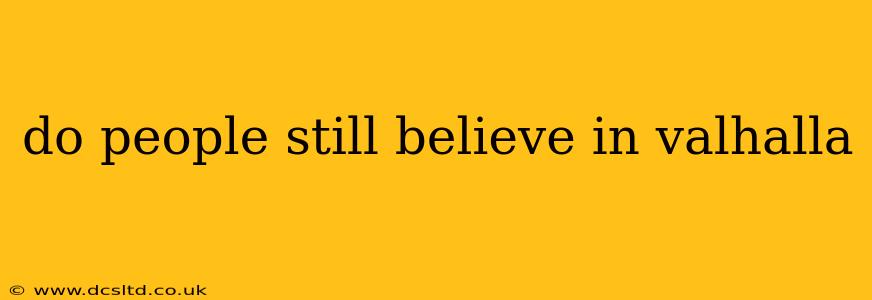Do People Still Believe in Valhalla?
The question of whether people still believe in Valhalla is complex. While it's not a widespread, organized religion in the modern sense, the concept of Valhalla continues to resonate with many individuals for various reasons, sparking ongoing interest and belief systems. It's less about a literal belief and more about a cultural and spiritual connection to a powerful mythology. Let's delve into the nuances of this fascinating topic.
What is Valhalla?
Before exploring modern beliefs, understanding Valhalla's origins is crucial. Valhalla, in Norse mythology, is a majestic hall located in Asgard, ruled by the god Odin. It's a glorious afterlife reserved for those who die honorably in battle. Valhalla is depicted as a place of feasting, revelry, and endless combat, where warriors prepare for Ragnarök, the apocalyptic battle that ends the world.
Who Believes in Valhalla Today?
Modern belief in Valhalla isn't monolithic. It manifests in several ways:
-
Heathens and Asatru: Members of these modern Norse pagan religions actively practice rituals and beliefs rooted in Norse mythology, including the concept of Valhalla. For them, Valhalla represents a spiritual ideal and a part of their religious cosmology. It's a significant part of their worldview and afterlife beliefs.
-
Fans of Norse Mythology and Pop Culture: Valhalla's captivating imagery and stories have been popularized through books, movies, video games (like God of War), and other forms of media. Many people are fascinated by the mythology without necessarily subscribing to a formal religious belief system. Valhalla's allure stems from its symbolism of heroic death, glory, and a warrior's afterlife.
-
Metaphorical Interpretation: Some individuals may appreciate Valhalla's symbolism without a literal belief. The concept might represent achieving one's full potential, leaving a lasting legacy, or finding a place of honor and remembrance after death. It becomes a metaphor for personal achievement and immortality.
Do People Literally Believe in a Physical Valhalla?
The answer to this is largely "no," at least not in a literal, geographical sense. Most individuals who engage with the concept of Valhalla today understand it within a mythological or symbolic context. While some Heathens and Asatru adherents may believe in a spiritual realm corresponding to Valhalla, they don't typically envision it as a physical place in the same way that one might imagine heaven or hell.
Is Belief in Valhalla Increasing or Decreasing?
The number of people who actively believe in Valhalla as a literal afterlife is relatively small compared to the global population. However, interest in Norse mythology and its associated concepts, including Valhalla, is arguably increasing due to its continued portrayal in popular culture. This fuels curiosity and engagement with the mythology, even if it doesn't translate into a strict religious belief for everyone.
What are the Modern Interpretations of Valhalla?
Modern interpretations of Valhalla are varied and often reflect individual perspectives:
- A Spiritual Reward: For some, Valhalla symbolizes a spiritual reward for a life lived with honor and courage. It’s a place of peace and contentment after a life well-lived.
- An Eternal Battle: Others may focus on the warrior aspect, seeing Valhalla as a place of eternal challenge and self-improvement through continuous combat.
- A Symbolic Paradise: Some may interpret Valhalla as a metaphor for paradise or a realm of ultimate fulfillment, aligning it with personal aspirations and achievements.
In conclusion, while a literal belief in a physical Valhalla is not widespread, the concept remains powerfully resonant. Its enduring appeal comes from a combination of factors: the mythology's inherent drama and symbolism, its exploration of themes like honor, death, and glory, and its continued presence in modern culture. The enduring fascination with Valhalla speaks to our ongoing human desire for meaning, legacy, and a sense of purpose beyond our earthly lives.
